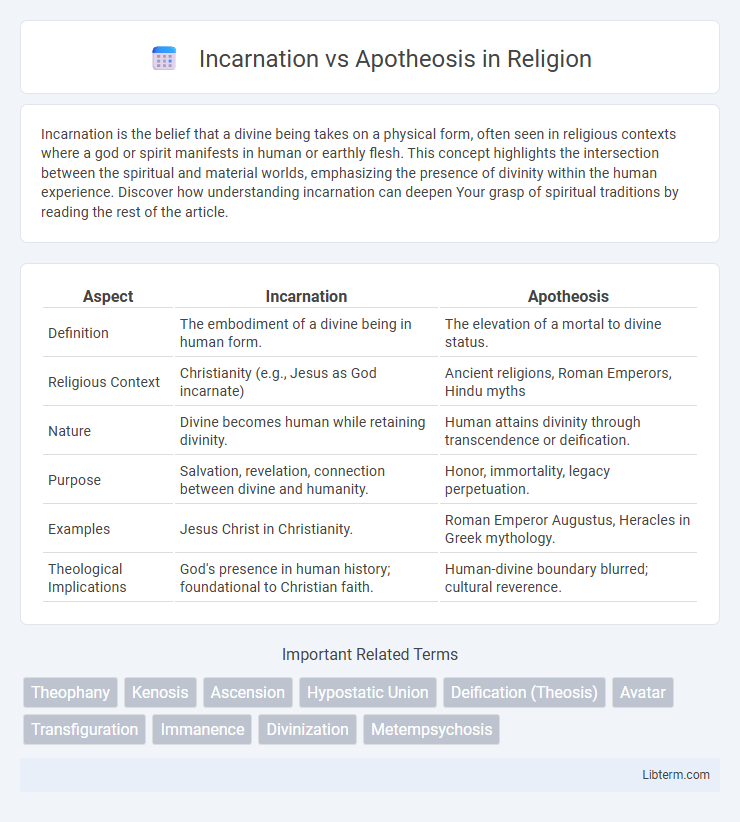Incarnation is the belief that a divine being takes on a physical form, often seen in religious contexts where a god or spirit manifests in human or earthly flesh. This concept highlights the intersection between the spiritual and material worlds, emphasizing the presence of divinity within the human experience. Discover how understanding incarnation can deepen Your grasp of spiritual traditions by reading the rest of the article.
Table of Comparison
| Aspect | Incarnation | Apotheosis |
|---|---|---|
| Definition | The embodiment of a divine being in human form. | The elevation of a mortal to divine status. |
| Religious Context | Christianity (e.g., Jesus as God incarnate) | Ancient religions, Roman Emperors, Hindu myths |
| Nature | Divine becomes human while retaining divinity. | Human attains divinity through transcendence or deification. |
| Purpose | Salvation, revelation, connection between divine and humanity. | Honor, immortality, legacy perpetuation. |
| Examples | Jesus Christ in Christianity. | Roman Emperor Augustus, Heracles in Greek mythology. |
| Theological Implications | God's presence in human history; foundational to Christian faith. | Human-divine boundary blurred; cultural reverence. |
Defining Incarnation and Apotheosis
Incarnation refers to the embodiment of a deity or spirit in a physical form, most commonly exemplified by religious figures such as Jesus Christ in Christian theology. Apotheosis denotes the elevation of a human being to divine status, often through exceptional deeds, divine favor, or formal deification in mythological and religious traditions. Both concepts explore the relationship between the mortal and the divine, with incarnation emphasizing descent into human form, while apotheosis highlights ascension into godhood.
Historical Origins of Both Concepts
The concept of Incarnation originates from ancient religious traditions, particularly within Christianity, where it signifies the embodiment of a deity in human form, exemplified by the belief in Jesus Christ as God incarnate. Apotheosis, rooted in ancient Greek and Roman cultures, involves the elevation of a mortal to divine status, often seen in the deification of emperors and heroes. Both concepts reflect humanity's efforts to bridge the divine and human realms but arise from distinct historical and cultural contexts with unique theological implications.
Incarnation in Major World Religions
Incarnation in major world religions, especially Christianity, refers to the belief that a divine being takes on a human form, exemplified by the doctrine of Jesus Christ as both fully God and fully man. Hinduism also presents incarnation through avatars, such as Vishnu's descent into earthly forms like Krishna and Rama, representing divine presence in the mortal realm. In contrast to apotheosis, which elevates a mortal to divine status posthumously, incarnation emphasizes a pre-existing deity assuming human existence for spiritual purposes.
Apotheosis in Ancient and Modern Contexts
Apotheosis, originating from ancient civilizations such as Greece and Rome, refers to the elevation of a mortal to divine status, often celebrated through myths, rituals, and monumental art. In contemporary contexts, apotheosis extends beyond religious traditions to symbolize the pinnacle of achievement or glorification in cultural, political, and artistic realms, reflecting humanity's enduring fascination with transcendence and perfection. This concept underscores the evolving interplay between mortal limitations and aspirational divinity across time, illustrating its semantic richness in both historical and modern narratives.
Key Philosophical Differences
Incarnation involves a divine being assuming human form, emphasizing the union of divine and human natures, as seen in Christian theology with Jesus Christ. Apotheosis refers to the elevation of a mortal to divine status, highlighting transformation and deification through virtue, heroism, or favor from gods, common in classical mythology. The key philosophical difference lies in incarnation's inherent divinity becoming human versus apotheosis's human becoming divine through merit or external intervention.
Cultural Interpretations and Symbolism
Incarnation embodies the concept of a divine being taking human form, prominent in Christian theology where God becomes man through Jesus Christ, symbolizing humility and salvation. Apotheosis refers to elevating a mortal to divine status, evident in ancient Roman culture where emperors were deified posthumously to signify supreme authority and immortality. Both concepts reflect cultural interpretations of divinity and transcendence, with incarnation emphasizing union and sacrifice, while apotheosis highlights glorification and exaltation.
Roles in Mythology and Literature
Incarnation in mythology and literature often represents the divine taking human form, embodying sacred qualities to influence mortal realms, as seen in figures like Krishna or Jesus. Apotheosis involves the elevation of a mortal to divine status, exemplified by heroes such as Hercules, symbolizing the ultimate transcendence through heroic deeds or moral virtue. These roles highlight differing narratives: incarnation bridges heaven and earth, while apotheosis celebrates human potential for divinity.
Comparative Theological Perspectives
Incarnation signifies the theological concept where a deity assumes human form, prominently seen in Christianity with Jesus Christ as God made flesh, emphasizing divine immanence and redemption. Apotheosis involves the elevation of a human to divine status, common in ancient Greco-Roman religions and certain Eastern philosophies, highlighting human potential and transcendence. Comparative theological perspectives reveal incarnation as a unique divine self-limitation, while apotheosis underscores human divinization, reflecting distinct doctrines of divinity and the sacred-human relationship.
Contemporary Relevance and Influence
Incarnation and apotheosis remain central themes in contemporary religious and cultural discourse, influencing modern theology and popular media. Incarnation, the embodiment of a deity in human form, shapes discussions on identity and divinity, particularly within Christian contexts where the figure of Jesus Christ exemplifies this concept. Apotheosis, the elevation of a mortal to divine status, informs narratives around heroism and transcendence, resonating in contemporary mythologies, literature, and even celebrity culture.
Summary: Implications for Spiritual Understanding
Incarnation represents the embodiment of a divine being in human form, emphasizing the accessibility and immanence of the sacred within the material world. Apotheosis signifies the elevation of a mortal to divine status, highlighting humanity's potential for transcendence and spiritual perfection. Both concepts shape spiritual understanding by contrasting divine descent with human ascension, influencing doctrines on salvation and the nature of divinity.
Incarnation Infographic

 libterm.com
libterm.com